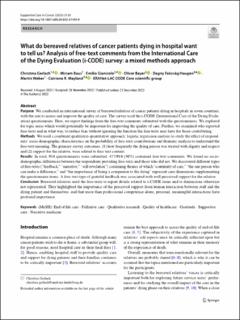| dc.contributor.author | Gerlach, Christina | |
| dc.contributor.author | Baus, Miriam | |
| dc.contributor.author | Gianicolo, Emilio | |
| dc.contributor.author | Bayer, Oliver | |
| dc.contributor.author | Haugen, Dagny Renata Faksvåg | |
| dc.contributor.author | Weber, Martin | |
| dc.contributor.author | Mayland, Catriona Rachel | |
| dc.date.accessioned | 2023-02-15T12:06:16Z | |
| dc.date.available | 2023-02-15T12:06:16Z | |
| dc.date.created | 2023-01-28T15:29:46Z | |
| dc.date.issued | 2023 | |
| dc.identifier.issn | 0941-4355 | |
| dc.identifier.uri | https://hdl.handle.net/11250/3051085 | |
| dc.description.abstract | Purpose
We conducted an international survey of bereaved relatives of cancer patients dying in hospitals in seven countries, with the aim to assess and improve the quality of care. The survey used the i-CODE (International Care of the Dying Evaluation) questionnaire. Here, we report findings from the free-text comments submitted with the questionnaires. We explored for topic areas which would potentially be important for improving the quality of care. Further, we examined who reported free-texts and in what way, to reduce bias without ignoring the function the free-texts may have for those contributing.
Methods
We used a combined qualitative-quantitative approach: logistic regression analysis to study the effect of respondents’ socio-demographic characteristics on the probability of free-texts contributions and thematic analysis to understand the free-text meaning. The primary survey outcomes, (1) how frequently the dying person was treated with dignity and respect and (2) support for the relative, were related to free-text content.
Results
In total, 914 questionnaires were submitted; 457/914 (50%) contained free-text comments. We found no socio-demographic differences between the respondents providing free-texts and those who did not. We discovered different types of free-texts (“feedback,” “narrative,” “self-revelation”) containing themes of which “continuity of care,” “the one person who can make a difference,” and “the importance of being a companion to the dying” represent care dimensions supplementing the questionnaire items. A free-text type of grateful feedback was associated with well perceived support for the relative.
Conclusion
Bereaved relatives used the free-texts to report details related to i-CODE items and to dimensions otherwise not represented. They highlighted the importance of the perceived support from human interaction between staff and the dying patient and themselves; and that more than professional competence alone, personal, meaningful interactions have profound importance. | en_US |
| dc.language.iso | eng | en_US |
| dc.publisher | Springer | en_US |
| dc.rights | Navngivelse 4.0 Internasjonal | * |
| dc.rights.uri | http://creativecommons.org/licenses/by/4.0/deed.no | * |
| dc.title | What do bereaved relatives of cancer patients dying in hospital want to tell us? Analysis of free-text comments from the International Care of the Dying Evaluation (i-CODE) survey: a mixed methods approach | en_US |
| dc.type | Journal article | en_US |
| dc.type | Peer reviewed | en_US |
| dc.description.version | publishedVersion | en_US |
| dc.rights.holder | Copyright 2022 The Author(s) | en_US |
| dc.source.articlenumber | 81 | en_US |
| cristin.ispublished | true | |
| cristin.fulltext | original | |
| cristin.qualitycode | 1 | |
| dc.identifier.doi | 10.1007/s00520-022-07490-9 | |
| dc.identifier.cristin | 2117215 | |
| dc.source.journal | Supportive Care in Cancer | en_US |
| dc.identifier.citation | Supportive Care in Cancer. 2023, 31, 81. | en_US |
| dc.source.volume | 31 | en_US |

